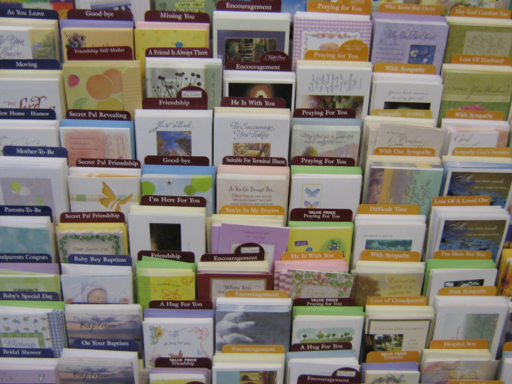Halloween is over and now we are in a season a priest friend used to call “Hallowthankmas.” Since Halloween decorations are up from just after Labor Day until Halloween itself, then Thanksgiving decorations are there until Thanksgiving Day. Christmas trees and lights are in the stores during both seasons. Unfortunately for those of us who celebrate Christmas as a season twelve days long, Valentine hearts and cupids appear in the stores on Christmas Day. All the commercial seasons seem to run together, so Hallowthankmas seems to fit just fine.
With the upcoming Christmas season, there are cards to be bought, pictures to be taken for the covers or to be included in the ones we send to family and friends. Usually we enclose some kind of short message or letter, telling everyone what we have done over the year, how much the kids have grown, who’s gone off to college, who’s gotten married or produced our first, second or dozenth grandchild. We also send greetings to everyone and wishes for a happy holiday season.
Paul’s letter to the Romans was the one epistle to a church he hadn’t founded and where he wasn’t personally known. One way to make points was to thank those who were familiar to the Romans, people who lived and served the Jesus Movement as Presiding Bishop Michael Curry refers to it. Among those mentioned were several women — Prisca (Priscilla), Mary, and Junia, a woman who has has finally been allowed to have her own feminine name, rather than the Junius assigned to her by men who could not accept women as apostles. Paul didn’t neglect the men, naming those who had traveled with him, were imprisoned with him, and who led the congregations. Even Paul’s secretary, Tertius, and their hosts, Gaius, Erastus, and Quartus, sent greetings. It was a family epistle sent to far-off family members.
We practice greeting each other when we pass the peace. There are some who will shake hands with the people within immediate range and those who will wander about the nave, hugging any- and everybody. We do it using phrases like “The peace of the Lord” or “Peace be with you,” phrases that are reminders that whatever the world offers us, we follow a Lord who offers much more. It’s our greeting to any who worship with us, whether we know them or not.
What about those who have worked with us. Do we remember to greet them and acknowledge their work and dedication? Paul remembered, even those who might have been ignored because of their gender. And he didn’t just mention them, he gave thanks for them and their work.
But what about those outside the church doors, the people we see on the street or maybe in the grocery store or even begging on the sidewalk? Do we greet them with the same kind of greeting we use for our friends in church? Do we even smile at them, even if we say nothing? Do we even acknowledge their presence and the image of God within them? The running child, the homeless man, the very professional woman picking up something for dinner on her way home from work — what about them. Do we even notice them much less greet them?
Maybe what we are supposed to learn is that whether it is for performance of tasks, acts of generosity, acknowledgement of commonalities, or just because they are fellow human beings, we should not just see them but notice them.
Greet the folks you know, but remember also to greet those you don’t — they might become new friends or co-workers.

